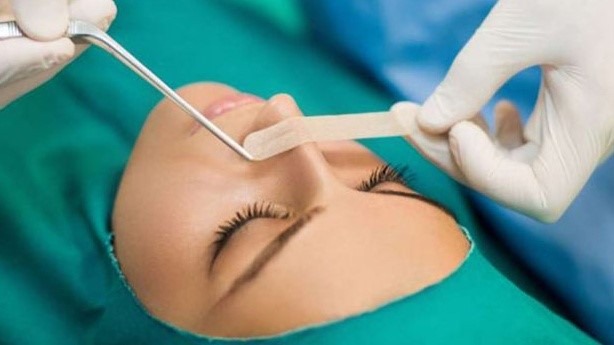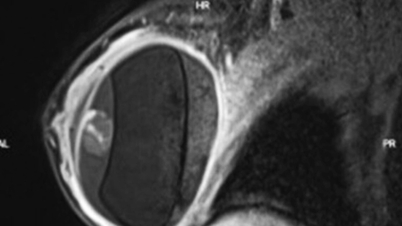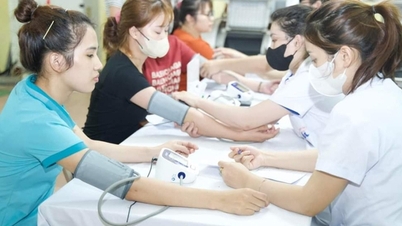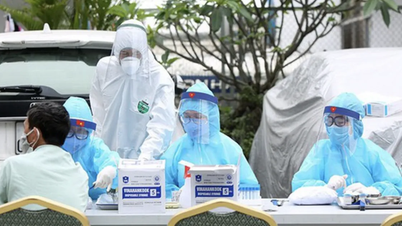Previously, he had injected liquid silicone, a type of filler that has been banned, with the hope of lifting his nose, filling in his sunken cheeks and smile lines according to feng shui.
 |
| Illustration photo. |
However, after the cosmetic surgery, his body began to react abnormally to scents from cosmetics, perfumes, toothpaste, detergents, and even other people's body odors in elevators or supermarkets.
According to Associate Professor, Dr. Hoang Thi Lam, Head of the Department of Clinical Immunology, Tam Anh General Hospital, Ho Chi Minh City, silicon is a non-degradable polymer compound. When injected into the body, the immune system will recognize it as a foreign object. Silicon does not dissolve but spreads around and then clumps under the skin, causing a prolonged inflammatory reaction, causing the body to lose immune control and become unusually sensitive to many substances.
Mr. H's case is a typical example of chronic allergy due to complications after silicone injection, with symptoms not only limited to the skin but spreading to serious systemic reactions such as anaphylactic shock.
Over the years, Mr. H. had to regularly use anti-allergy drugs containing corticosteroids. However, prolonged use without proper prescription led to Cushing's syndrome, adrenal insufficiency and diabetes.
According to Dr. Lam, corticosteroids can be life-saving in acute allergic reactions, but if abused or used arbitrarily for a long time, they will lead to a series of dangerous endocrine disorders.
After a professional consultation, the doctors determined that the best treatment option was to surgically remove the silicon lumps. However, because this substance has existed in the body for too long, causing complex chronic inflammation, combined with underlying diseases such as adrenal insufficiency and diabetes, surgery would pose a great risk to life.
Mr. H. refused surgery, so the doctors switched to medical treatment, focusing on controlling allergies and stabilizing underlying diseases to prevent complications.
Because the body reacts to many common medications, doctors are forced to choose less effective drugs, which are long-term, expensive, and have many potential side effects.
Ultimately, the treatment of choice was a biologic containing omalizumab, a monoclonal antibody that treats severe allergic reactions. The treatment involves six to eight injections, given once a month, to control symptoms without affecting the already weakened adrenal glands.
After 4 injections and strict adherence to the treatment regimen, Mr. H's allergy improved significantly, decreasing by about 70%. He was able to use some antibiotics, and his sensitivity to scents also decreased significantly. Although he still had hives and was sensitive to chemicals, the severity was milder and no longer life-threatening as before.
Associate Professor, Dr. Hoang Thi Lam recommends that when there are signs of prolonged allergies such as hives, itching, runny nose, swollen eyelids, difficulty breathing... people should not be subjective or arbitrarily use medicine at home. This could be a manifestation of immune disorders or chronic allergies to many allergens such as pollen, food, drugs, chemicals, house dust or weather.
Visiting a clinical immunologist, doing an allergy test and a quantitative IgE test will help diagnose the exact cause and have an appropriate treatment regimen, avoiding the disease from progressing to a severe, life-threatening form.
Mr. H's case is a warning about the long-term and unpredictable consequences of beautifying with fillers of unknown origin at unqualified cosmetic facilities.
Beauty treatments should be performed at reputable medical facilities and beauty salons, with highly specialized doctors and approved products. People need to learn carefully about the risks before performing any form of cosmetic intervention, so as not to suffer consequences that last for many years like the case above.
Source: https://baodautu.vn/di-ung-nang-sau-9-nam-tiem-silicon-nang-mui-d370359.html


![[Photo] Da Nang: Water gradually recedes, local authorities take advantage of the cleanup](https://vphoto.vietnam.vn/thumb/1200x675/vietnam/resource/IMAGE/2025/10/31/1761897188943_ndo_tr_2-jpg.webp)
![[Photo] Prime Minister Pham Minh Chinh attends the 5th National Press Awards Ceremony on preventing and combating corruption, waste and negativity](https://vphoto.vietnam.vn/thumb/1200x675/vietnam/resource/IMAGE/2025/10/31/1761881588160_dsc-8359-jpg.webp)









































































































Comment (0)